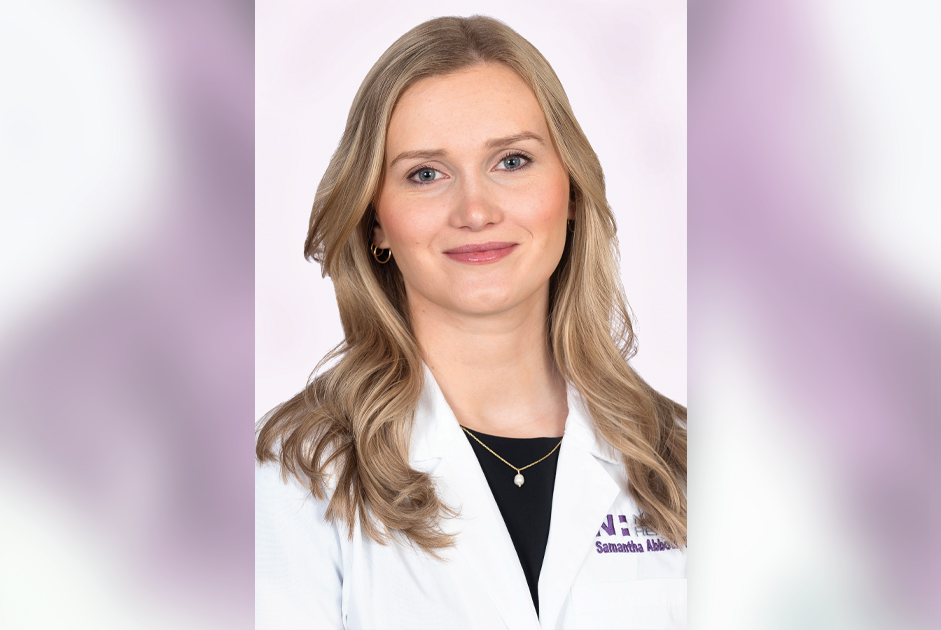September is National Vascular Disease Awareness Month and it’s a great time to remember that strong veins are essential for an overall healthy life.
As the only vein clinic in the Triad staffed entirely by vascular surgeons and supported by a strong team of physician assistants, Novant Health Vein Specialists can offer state-of-the-art technology and individualized treatments to help you address painful and unsightly veins. This month, we caught up with the newest PA, Samantha Abbott, who provided great information about venous insufficiency and how she and her team can help you.
Meet Samantha Abbott, PA
Samantha, a graduate of the University of Florida and an avid runner, loved the idea of moving to North Carolina to be close to the mountains. Although she considered the field of public health, an experience with EMT school told her she was more suited for hands-on care. She admires the culture at Novant Health, where everyone is approachable, focused solely on quality care, and committed to helping people thrive.
FW: What is venous insufficiency and how do you diagnose it?
SAMANTHA: Chronic venous insufficiency (CVI) is a form of vascular disease that occurs when the veins in your legs are damaged. As a result, these veins can’t manage blood flow as well as they should, and it’s difficult for blood in your legs to return to your heart. CVI causes blood to pool within your leg veins, leading to high pressure in those veins. In short, blood is flowing in the wrong direction, as valves may open to let blood go up your leg, then quickly close so it can’t go backward.
This high venous pressure can make more valves weaken and malfunction. Chronic venous insufficiency can cause damage to your deep veins, which are large veins deep in your body that run through your muscle, superficial veins, which are close to the skin’s surface, and perforating veins, which connect your deep and superficial veins. CVI may also be a sign you have a blood clot deep in your leg, a condition called a deep vein thrombosis or DVT.
Symptoms may include a dull, achy pain, and swelling that gets worse throughout the day. We also tell patients to look for hyperpigmentation on ankles or feet, or a wound (ulcer) that comes out of nowhere.
Fortunately, venous insufficiency is easy to diagnose using ultrasound that is performed by a licensed and accredited technician. It’s important to seek the help of vascular surgeons from the beginning, rather than receive a diagnosis deemed cosmetic, and not covered by insurance. At Novant Health Vein Specialists, our providers are trained to do it all.

FW: What are the most common causes of venous insufficiency?
SAMANTHA: First, it is important to note that more than 25 million individuals in the United States experience some form of vein disease. And we’ve found that it’s more common in women, especially after multiple pregnancies, and in people middle-aged or older.
The causes of venous insufficiency and varicose veins largely depend on genetics, and yes, a tendency towards varicose veins does run in families. The condition can also occur post-pregnancy, or from long periods of sitting or standing as fluid literally backs up when your legs are hanging down. We often see this condition in teachers, factory shift workers, construction workers and even dancers, where people are standing for hours.
Excess weight and leading a sedentary lifestyle can also contribute to vein issues — but a program of regular walking, even if it’s just around your neighborhood, can help improve the health of your veins.
FW: What are some treatment options available at Novant Health Vein Specialists?
SAMANTHA: I tell my patients that they don’t have to live with painful or unsightly veins. There are several options, and surgery is not always necessary. While chronic venous disease is incurable, it is treatable with medications, sclerotherapy, phlebectomy or radiofrequency ablation (RFA).
RFA, also known as endovenous laser therapy, uses heat energy to seal the walls of the vein together, causing them to collapse and eventually disappear, allowing blood to be diverted to other healthy veins in the leg. Once the diseased vein is closed off, healthy veins take over and effectively empty blood from your legs. Sclerotherapy is a treatment for spider veins, done with injections in 15-minute sessions — with ultrasound guidance — where veins literally dry up, and the coloring of the vein fades or disappears. For veins that are too small for ablation or too large for sclerotherapy, microphlebectomy is an option. The clinician makes several 2 or 3mm incisions to remove veins completely.
FW: What advice do you have to help alleviate vein issues?
SAMANTHA: It’s important to elevate your legs whenever possible and limit long periods of sitting and standing. If you’ll be taking a long trip, consider wearing compression socks to keep blood from pooling around your feet and causing swelling.
You can also have your veins checked regularly. Novant Health Vein Specialists offers a free monthly screening in our Winston-Salem location. The remaining dates for 2023 include Sept. 14, Oct. 12, Nov. 9 and Dec. 7.
Screening can actually save your life — and at the very least, improve your quality of life. To schedule your free vein screening appointment, or to learn more about venous insufficiency, visit SalemVeins.com, or call us at 336-776-3160.



















